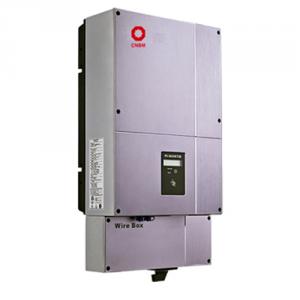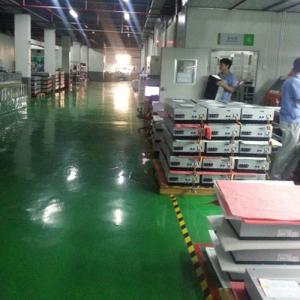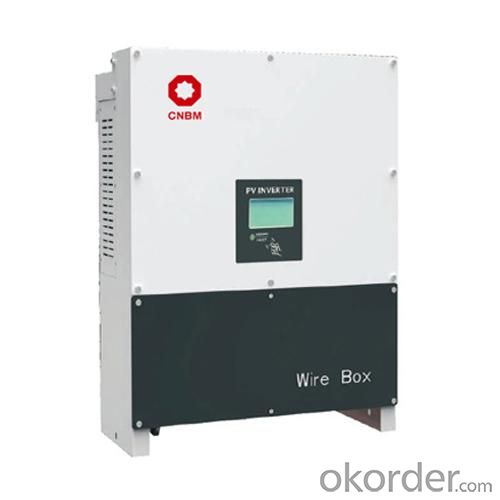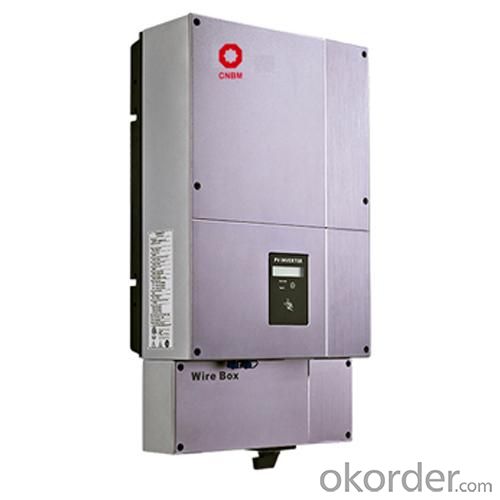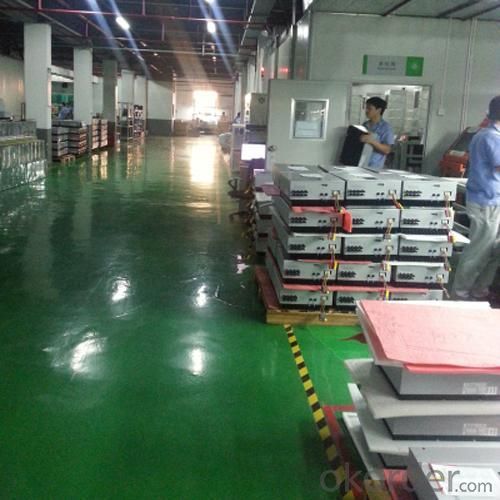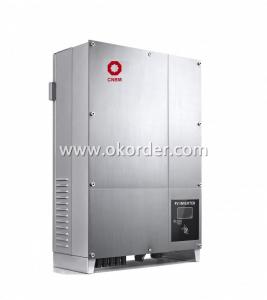3000W Grid Tied Solar Inverter 3-Phase 12000W
- Loading Port:
- Shenzhen
- Payment Terms:
- TT or LC
- Min Order Qty:
- 1 unit pc
- Supply Capability:
- 5000Units/per month pc/month
OKorder Service Pledge
OKorder Financial Service
You Might Also Like
Grid Tied Solar Inverter 3-phase 12000W
CNBM International Corporation (CNBM International) is the most important trading platform of CNBM Group Corporation, a state-owned company under the direct supervision of State-owned Assets Supervision and Administration Commission of the State Council.
With a R&D team more than 100 engineers,40% of the staff, who has been deeply engaged in the photovoltaic industry for 10 years, CNBM takes the mission to increase the inverter availability and efficiency, putting continuous innovation to make CNBM inverter easier for installation and operation, and more cost-effective for solar plant construction. The full range of CNBM single phase inverters has received VDE, CE, G83/1, G59/2, ENEL2010, VDE4105, C10/C11, AS4777 etc.
Maximum efficiency of 97.8% and wide input voltage range, Internal DCswitch,MTL-String, Sound control,Bluetooth/RF technology /WiFiTransformerless,GT topology
The Grid Connected Solar Inverter we can offer is 1.5kw to 20kw.
Introduction of Grid Tied Solar Inverter 3-phase 12000W
Maximum efficiency of 97.8% and wide input voltage range
Integrated DC switch-disconnected
MTL-String
Sound control
Bluetooth/RF technology /Wi-Fi
Transformerless GT topology
5 years warranty (10years as optional)
Datasheet of Grid Tied Solar Inverter 3-phase 12000W
Model | 10000TL3-US | 12000TL3-US | 18000TL3-US | 20000TL3-US |
Input data(DC) | ||||
Max. DC Power | 10500W | 12500W | 18750W | 20850W |
Max. DC voltage | 600V | 600V | 600V | 600V |
Start voltage | 120V | 120V | 120V | 120V |
PV voltage range | 80V-600V | 80V-600V | 80V-600V | 80V-600V |
Max. input current of the MPP tracker A/tracker B | 21A/21A | 25A/25A | 38A/38A | 42A/42A |
Number of MPP trackers/strings per MPP tracker | 2/3 | 2/3 | 2/6 | 2/6 |
Output data(AC) | ||||
Nominal output power | 10000W | 12000W | 18000W | 20000W |
Nominal AC voltage | 480V | 480V | 480V | 480V |
AC voltage range | 422-528VAC | 422-528VAC | 422-528VAC | 422-528VAC |
Nominal AC grid frequency | 60 Hz | 60 Hz | 60 Hz | 60 Hz |
Max. output current(cos φ=1) | 12.0A | 14.5A | 21.5A | 24A |
Power factor(cos φ) | >0.99 | >0.99 | >0.99 | >0.99 |
Harmonics | <3% | <3% | <3% | <3% |
Grid connection type | 3/N/E | 3/N/E | 3/N/E | 3/N/E |
Efficiency | ||||
Max. efficiency | 97% | 97% | 97.5% | 97.5% |
CEC-Weighted efficiency | 95.5% | 95.5% | 96% | 96.5% |
MPPT efficiency | 99.5% | 99.5% | 99.5% | 99.5% |
Protection devices | ||||
Input over voltage protection -DIN rail surge arrester(Option) | Class II | Class II | Class II | Class II |
DC insulation measure | yes | yes | yes | yes |
AC short circuit protection | yes | yes | yes | yes |
Output over voltage protection -Varistor | yes | yes | yes | yes |
Output over voltage protection -DIN rail surge arrester(Option) | Class II | Class II | Class II | Class II |
String fuse type/size(Option) | 15A/600VDC 10*38mm | 15A/600VDC 10*38mm | 15A/600VDC 10*38mm | 15A/600VDC 10*38mm |
General Data | ||||
Dimensions(W*H*D) in mm | 530*705*247 | 530*705*247 | 650*740*247 | 650*740*247 |
Weight | 46kg/101.5lb | 46kg/101.5lb | 63kg/138.9lb | 63kg/138.9lb |
Operating ambient temperature range | –25°C ... +60°C | –25°C ... +60°C | –25°C ... +60°C | –25°C ... +60°C |
Altitude | ≤2000m/6560ft | |||
Self Consumption night | < 3 W | < 3 W | < 3 W | < 3 W |
Topology | Transformerless | |||
Cooling concept | Fan Cool | Fan Cool | Fan Cool | Fan Cool |
Electronics protection rating /connection area | NEMA 3R | NEMA 3R | NEMA 3R | NEMA 3R |
Features | ||||
Display | Graphic | Graphic | Graphic | Graphic |
Interface:RS232/RS485/ Bluetooth/RF/Zigbee/Wifi | yes/yes/opt/opt /opt/opt | |||
Warranty:10 years /15 years | yes/opt | yes/opt | yes/opt | yes/opt |
Certificates and approvals | UL1741,UL1998,IEEE1547,FCC part 15(class B),CSA C22.2 No.107.1 | |||
Picure1: Factory of Grid Tied Solar Inverter 3-phase 12000W
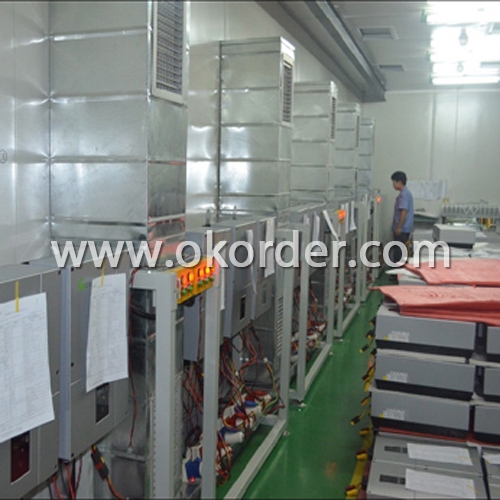
Picture 2: Package of Grid Tied Solar Inverter 3-phase 12000W
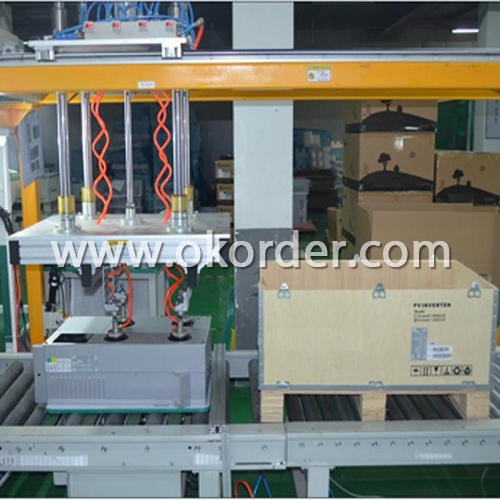
- Q: Photovoltaic grid-connected inverter without DC emc how will happen
- When solar or other light illuminates the PN junction of the semiconductor, a voltage (called a photogenerated voltage) occurs on both sides of the PN junction. This phenomenon is the famous photovoltaic effect.
- Q: How is the efficiency of a solar inverter measured?
- The efficiency of a solar inverter is typically measured by dividing the output power of the inverter by the input power, and then multiplying the result by 100 to get a percentage value.
- Q: How does a solar inverter protect against power surges?
- A solar inverter protects against power surges by using built-in surge protection devices such as metal oxide varistors (MOVs) or transient voltage suppressors (TVS). These devices act as a barrier, diverting excess voltage from entering the inverter and the connected solar panels. This prevents damage to the inverter and other sensitive electronic components by ensuring that the voltage stays within safe limits.
- Q: What is the role of transformerless design in a solar inverter?
- The role of transformerless design in a solar inverter is to eliminate the use of a bulky and costly transformer, which helps reduce the overall size, weight, and cost of the inverter. Additionally, a transformerless design allows for higher efficiency and improved performance of the solar inverter.
- Q: How do I choose the right solar inverter for my system?
- When choosing the right solar inverter for your system, there are a few key factors to consider. First, determine the size and capacity of your solar panels to ensure compatibility. Next, consider the type of inverter you need, whether it's a string inverter, micro inverter, or power optimizer. Additionally, assess the efficiency and reliability of the inverter, as well as its warranty and after-sales support. Finally, consider your budget and any specific features you may require, such as monitoring capabilities or grid connectivity options. It's important to research and compare different models to find the one that best fits your specific solar system needs.
- Q: What is a solar inverter?
- A solar inverter is a device that converts the direct current (DC) electricity generated by solar panels into alternating current (AC) electricity that can be used to power household appliances and be fed back into the grid.
- Q: What are the key differences between a central inverter and a string inverter?
- The key differences between a central inverter and a string inverter lie in their design and functionality. A central inverter is a single large inverter that is typically installed at a central location in the solar power system. It receives the DC power generated by multiple solar panels connected in series, and then converts it into AC power for use in the electrical grid. Central inverters are more suitable for large-scale solar installations as they can handle higher power outputs. On the other hand, a string inverter is a smaller inverter that is installed close to the solar panels. It works by converting the DC power generated by a string of panels, typically 8 to 12, into AC power. String inverters are commonly used in residential or smaller commercial solar installations. One notable difference is the location of the inverters. Central inverters are typically installed in a dedicated room or enclosure, away from the solar panels, whereas string inverters are generally mounted either on the wall or directly on solar panel mounting racks. Another difference is the impact of shading or panel malfunction. In a central inverter system, if one panel is shaded or malfunctions, it affects the output of the entire string of panels. In contrast, with a string inverter system, the impact is limited to only the affected string, allowing other strings to continue generating power efficiently. Additionally, string inverters offer better monitoring capabilities as they can provide real-time data for each individual string of panels, allowing for easier troubleshooting and maintenance. Central inverters, on the other hand, provide a single output value for the entire solar array. Overall, the choice between a central inverter and a string inverter depends on the scale of the solar installation, the available space, and the specific requirements of the project.
- Q: What is the maximum output voltage of a solar inverter?
- The maximum output voltage of a solar inverter is typically determined by the specific model and specifications of the inverter being used. It can vary depending on factors such as the size and configuration of the solar array it is connected to. Generally, for residential solar installations, the maximum output voltage of a solar inverter can range from 230V to 240V for single-phase systems, and up to 400V for three-phase systems.
- Q: What is the role of a solar inverter in a grid-independent system?
- The role of a solar inverter in a grid-independent system is to convert the direct current (DC) generated by the solar panels into alternating current (AC) that can be used to power household appliances and other electrical loads. It also manages the flow of electricity between the solar panels, batteries (if present), and the electrical loads, ensuring optimal energy utilization and system efficiency. Additionally, a solar inverter in a grid-independent system may incorporate advanced features like battery charging and discharging control, voltage regulation, and monitoring capabilities to ensure the stability and reliability of the system.
- Q: Are there any voltage or frequency regulations for solar inverters?
- Yes, there are voltage and frequency regulations for solar inverters. These regulations vary by country and are typically established by regulatory bodies or standards organizations. They ensure that the output voltage and frequency of solar inverters meet the required standards to ensure grid compatibility and prevent any potential damage to the electrical infrastructure.
Send your message to us
3000W Grid Tied Solar Inverter 3-Phase 12000W
- Loading Port:
- Shenzhen
- Payment Terms:
- TT or LC
- Min Order Qty:
- 1 unit pc
- Supply Capability:
- 5000Units/per month pc/month
OKorder Service Pledge
OKorder Financial Service
Similar products
Hot products
Hot Searches
Related keywords

